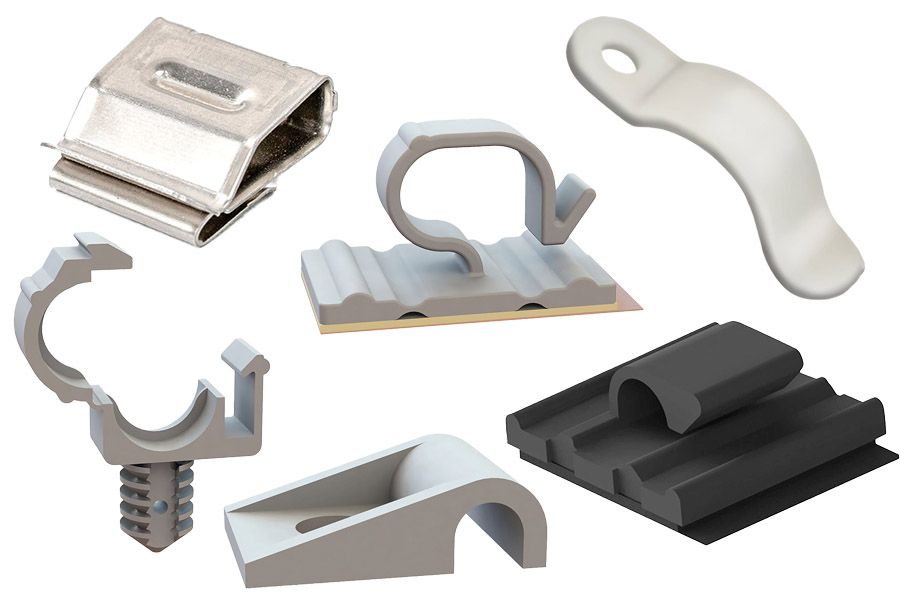
Cable clips are a simple but effective solution for managing cables and wires. Sometimes, purchasing cable clips is as simple as replacing existing stock.
However, for first time purchases or when needs change, a little background information can be useful in achieving the best outcome.
The purpose of this guide is to provide some easy to consume information to help those with responsibility of product purchasing, make the best decisions or at least, know the right questions to ask.
What exactly are cable clips?
Cable clips are small plastic or metal devices that are used to secure cables and wires in place. They are designed to hold cables and wires in an organized manner, reducing clutter and preventing tangling.
What are the many uses for cable clips?
Cable clips are used in a wide range of applications, including home and office organization, electrical installations, automotive repairs, and DIY projects. They can be used to secure cables and wires to walls, ceilings, and floors, and they are commonly used in entertainment systems, computer setups, and lighting fixtures.
What are the advantages of cable clips?
Cable clips provide a number of benefits, including:
- Improved organization: Cable clips keep cables and wires neatly organized and prevent them from becoming tangled.
- Increased safety: By securing cables and wires in place, cable clips reduce the risk of tripping and prevent damage to the cables.
- Easy installation: Cable clips are easy to install and can be attached to a variety of surfaces.
- Versatility: Cable clips can be used in a wide range of applications, making them a versatile tool.
What materials are cable clips made from?
Cable clips are typically made from plastic or metal. Plastic cable clips are lightweight and easy to install, while metal cable clips are more durable and can withstand heavier loads.
What sizes do cable clips come in?
Cable clips come in a variety of sizes, ranging from small clips that can hold a single cable to larger clips that can hold multiple cables at once.
What are the various types of cable clips?
There are many different types of cable clips available, including;
- Adhesive cable clips: These clips are designed to be attached to a surface using a strong adhesive backing. They are easy to install and can be used in a wide range of applications.
- Screw-in cable clips: These clips are attached to a surface using screws, providing a secure and permanent attachment. They are commonly used in electrical and automotive applications.
- P Clips: P clips are named after their shape, which resembles the letter "P." They are commonly used to secure cables and wires in automotive and industrial applications.
- Wire clips: Wire clips are small plastic or metal devices that are used to hold wires in place. They are often used in electrical installations and can be attached to walls or other surfaces.
- Fuel line clips: Fuel line clips are used to secure fuel lines in automotive applications. They are designed to withstand exposure to fuel and other chemicals.
- Ribbon clips: Ribbon clips are used to secure ribbon cables in electronic devices. They are designed to hold multiple cables at once and can be used to reduce clutter in tight spaces.
What is the difference between cable clips and wire clips?
Wire clips and cable clips are both used to secure and organize wires and cables, but there are some differences between the two.
Wire clips are typically used to hold thin wires or cords, such as those found in headphones, chargers, or small electronic devices. They are usually made of plastic or metal and come in different sizes to accommodate different wire diameters. Wire clips are often designed to be mounted with adhesive tape or screws and can be easily removed if necessary.
On the other hand, cable clips are generally used to manage larger cables or wires, such as those found in computer and networking equipment, home theatre systems, or electrical installations.
Cable clips are often made of plastic or rubber and come in different shapes and sizes to hold cables securely in place. They are designed to be mounted with adhesive tape, screws, or nails and are usually more durable than wire clips.
In summary, the main difference between wire clips and cable clips is the size and strength of the wires or cables they are designed to hold. Wire clips are typically used for thin wires, while cable clips are designed for larger cables.
What are some of the many factors to consider when purchasing cable clips?
When purchasing cable clips, there are several factors that you should consider to ensure that you choose the right type of clip for your needs. These factors include:
- Cable size: Make sure to choose a clip that is the right size for the cables you want to secure. Clips that are too small or too large may not hold the cables securely.
- Load capacity: Consider the weight of the cables and the load capacity of the clips. Clips that are not strong enough to hold the weight of your cables may break or become loose over time.
- Material: Choose a clip that is made from a durable material that can withstand the environment in which it will be used. Plastic clips are lightweight and easy to install, while metal clips are more durable and can withstand heavier loads.
- Application: Consider the specific application for which you need the cable clip. Different types of clips may be more suitable for certain applications, such as automotive, electrical, or industrial.
- Installation method: Look for clips that are easy to install and can be attached to the surface where you need them. Some clips may require drilling or other special tools, while others can be attached using adhesive or screws.
- Quantity: Consider how many clips you will need for your project or application. Buying clips in bulk may be more cost-effective than buying them individually.
- Brand and quality: Choose a reputable brand and look for high-quality clips that will provide reliable performance and last for a long time.
By considering these factors, you can choose the right cable clips for your needs and ensure that your cables are organized, secure, and safe.
If you have any further questions regarding cable clips, please don’t hesitate to call our experts at NPA on (08) 8268 2733 or click here to view our range available for sale online.
View other products in the NPA Buyer’s Guide Series

